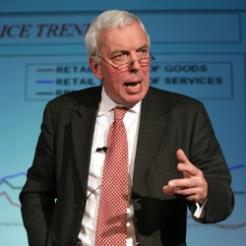The UK’s economy is slowly recovering, and finding ways to reduce the £200bn spend on benefits and encourage more exports to emerging markets would help this process, says Dennis Turner, former chief economist at HSBC.
Addressing the Charity Investment Forum hosted by Civil Society Media yesterday, Turner said that the recession is now “well and truly over” and gave his views on how the UK can hope to ease its national debt.
“If we’re going to make serious inroads into the size of the national debt, and the public sector spending deficit, you have to tackle the big number,” he said. “And the biggest number is state spending on benefits, which account for £200bn, 30 per cent of all government spending.”
He also said that it was impossible to avoid our own economy being affected by the Eurozone crisis, since over 50 per cent of UK exports go to the European Union: “If people don’t spend, it’s hard to sell,” he said and advised that the UK should instead focus its export efforts on the emerging ‘BRIC’ markets of Brazil, Russia, India and China.
Turner predicted that inflation will continue to come down, and so interest rates would stay low as a consequence, meaning sterling will remain competitive.
All this means that consumers will slowly become empowered to spend again, he said. He also predicted that the private sector would start to invest once more, and that he did not foresee a triple-dip recession.
But he warned: “Sluggish growth will be as good as it gets.”
Low interest payments to ease debt burden
Turner pointed out that that because of historically-strong credit ratings, the UK is fortunate to be subject to lower interest rates than many other countries.
“We have a huge national debt,” Turner stressed. “However, debt per se is not the issue. What matters is how much it is costing to service. Britain today, believe it or not, is borrowing money at historically low rates of interest. We can borrow at under 2 per cent – Spain and Italy have actually been paying 7 per cent, but our borrowing rate is comparable with Germany.
“We can borrow at low rates of interest because people who lend us money quite like us. They look at Britain and see a fundamentally sound economy that always pays its bills. Until a few weeks ago, we were one of only 17 countries in the world with a triple A credit rating.”









